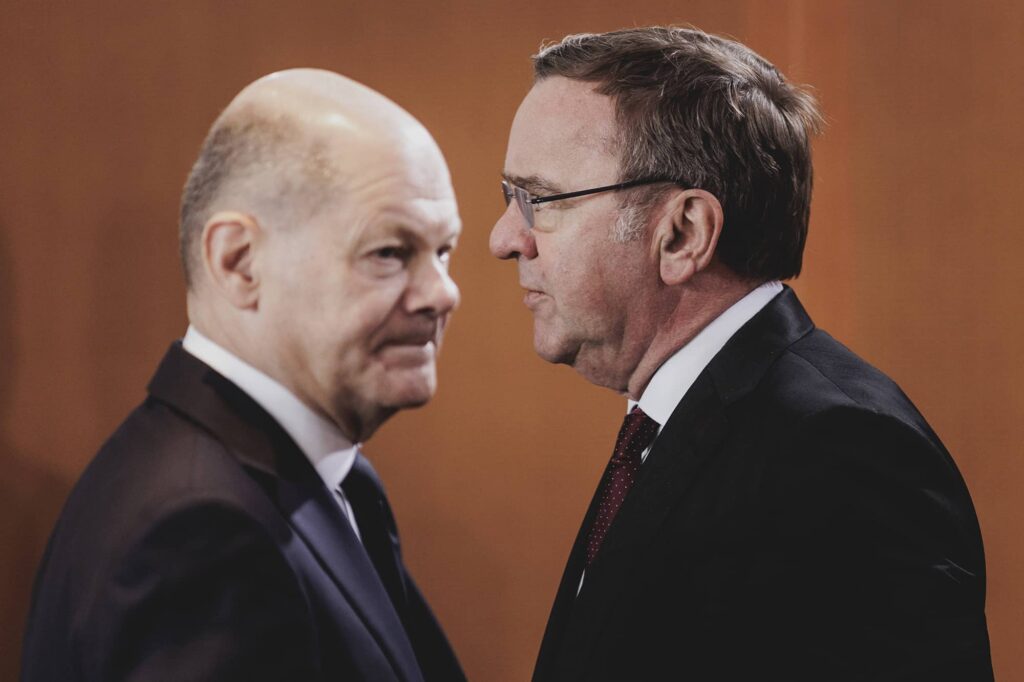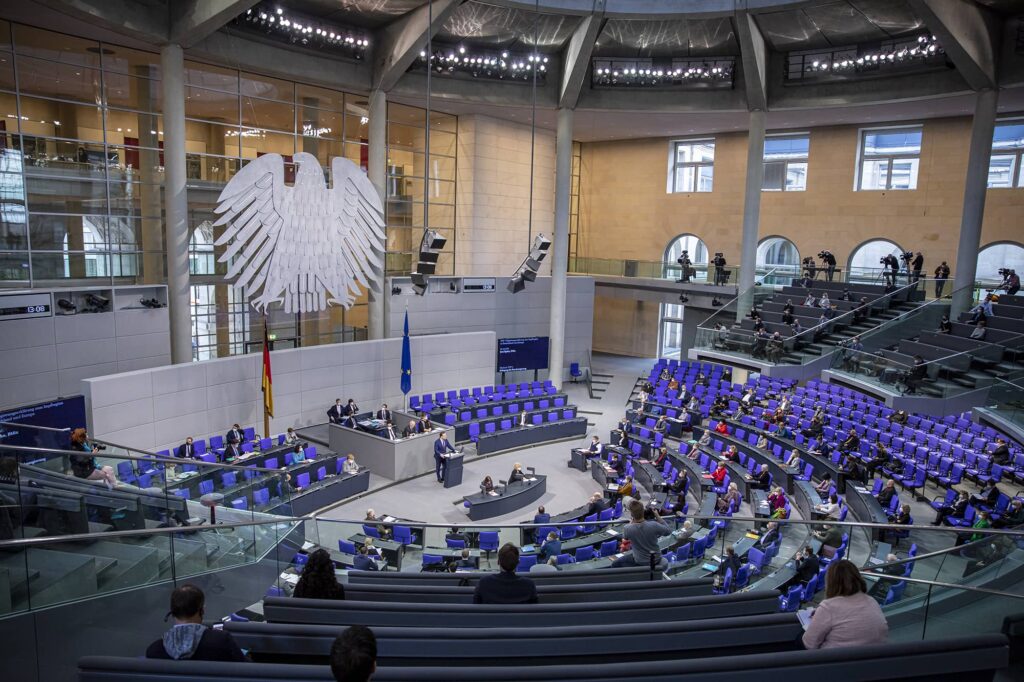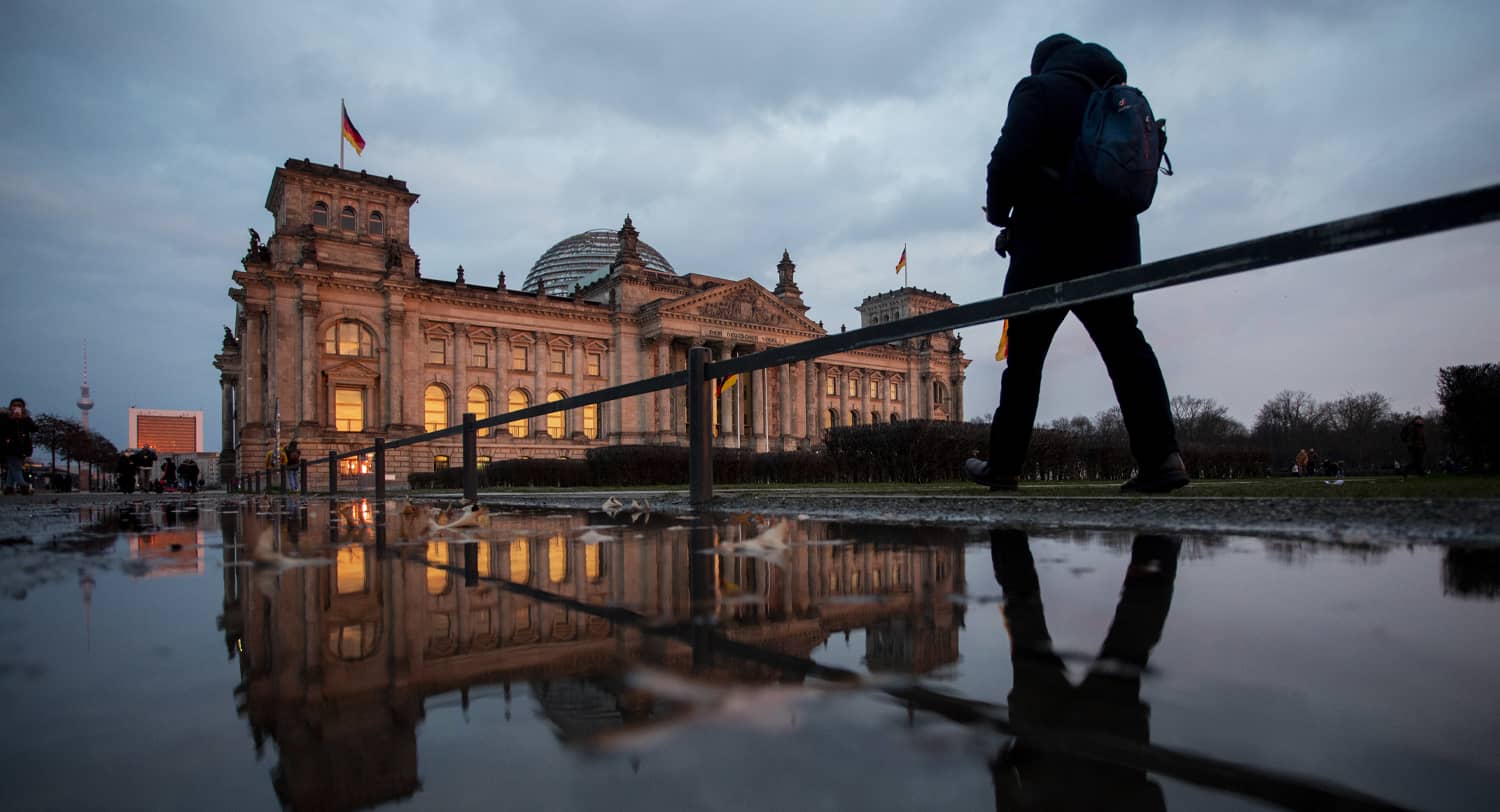The German term Zeitenwende, or historic turning point, entered the American political lexicon three days after the Russian invasion of Ukraine, on February 24, 2022. On that day, Chancellor Olaf Scholz convoked a special session of the Bundestag and employed this term to underscore the need for a dramatic change in Germany’s foreign and national security policies.
More recently, on May 23, 2024, Scholz wrote in The Economist: “In Germany, we changed our constitution to establish a 100 billion Euro fund in order to rebuild and modernize our army. Our goal is to turn the Bundeswehr into Europe’s strongest conventional force. As of this year, and in the future, we will be spending two percent of gross domestic product on defense…. These are unprecedented, tectonic shifts in Germany’s security and defense policy.”
Germany’s defense minister, Boris Pistorius, delivered a similar message in a speech at Johns Hopkins University: Germany has woken up and is facing up to the challenging strategic military reality, the peace dividend is over, and Germany will pay its share for defense. “Two percent of GDP for defense,” he said, “will be the floor, and not the ceiling.” He added, “Russia will not outlast us,” regarding Germany’s support for Ukraine.
Reassuring to Americans? In part, yes. Germany’s support for Ukraine is impressive, not just in terms of the delivery of heavy weapons and equipment, , but also other tangible assistance such as taking in almost 1.2 million refugees, the highest number within the European Union. Germany’s chancellor and his Social Democratic allies project an image of a resolute Germany, closely aligned with the United States, yet claiming security leadership in Europe.
On the other hand, Germany’s internal public discourse in the media and think tanks remains skeptical of this Zeitenwende. Hesitancy, delay and contradiction, lack of leadership, short-term thinking, and outright accounting tricks are frequent criticisms of the chancellor and his government. The skepticism arises not only from conservatives but also from other quarters and is based on the following factors.
The Decades-Long Addiction to a Peace Dividend
Successive German governments, at least since the era of Christian Democratic Chancellor Angela Merkel, ignored an important constitutional mandate, namely, to provide for the defense of the Federal Republic of Germany. For three decades, Germans operated on the assumption of a “peace dividend” – the Cold War had ended and with it the need for defense against any threat. Former Defense Minister Volker Ruehe used to say that “Germany finds itself encircled by friends only.” Consequently, the German Armed Forces were seen as superfluous and obsolete; neglect and underfunding were politically convenient. “Frieden schaffen mit weniger Waffen” (creating peace with fewer weapons) became a popular slogan.
While Russia theoretically remained a threat, the German political class – and business leaders as well – believed the Russian leadership could be tamed through economic incentives, above all import of Russian energy. The gas pipelines Nord Stream 1 and the construction of Nord Stream 2 (after 2015) for gas from Russia to Germany enjoyed the support of all German governments.
Germans assumed that the Kremlin elite would apply a rational cost-benefit calculation towards its strategic outlook. Critics who warned of Putin’s neo-revisionist longing were ridiculed as Cold War-mongers. When Russia in 2014 invaded Ukraine and annexed the Crimea, the German government (with France) sort of switched gears: the negotiations towards the Minsk 1 and Minsk 2 agreements were the result of an appeasement strategy vis-à-vis Russia. Germans found reason to still pursue the Nord Stream 2 deal with Russia – even while allies like Poland, the Baltic States, and Ukraine rang alarm bells. Cheap energy from Putin’s Russia intoxicated sober political judgment. And at that point, Germany refused to deliver any weapons to Ukraine.
Centrifugal Forces Inside the Coalition Government
The German government is an Ampel (traffic light) coalition of three parties representing divergent political philosophies. Chancellor Olaf Scholz’s Social Democrats claim to strive for social justice and are willing to increase federal budgets to further bolster the social safety net. Demands like retirement at age 63 with full benefits, the four-day work week, a minimum “Buergergeld” (citizen income) for low income and unemployed citizens are controversial, even within the governing coalition, and outright opposed by the opposition. Furthermore, the Social Democrat Party has traditionally been the home of a rather strong pacifist wing adverse to defense spending. Memories are still strong about Willy Brandt’s Ostpolitik.
The Green Party’s bread and butter issue has been “climate change,” and consequently the development of alternative energy. The tendency of the Greens to regulate and mandate remedies for a “sustainable lifestyle” has triggered opposition in some political quarters. At the same time, Foreign Minister Annalena Baerbock and Economics Minister Robert Habeck have surprised many skeptics with their steadfast support for Ukraine. In Germany, “green” voices have been the loudest calling for the delivery of additional weapons to Ukraine and the most outspoken critics of the Chancellor’s hesitation in this regard.
The Free Democratic Party stands for a more libertarian approach and believes that the market rather than government bureaucrats should decide which industry or corporation ought to be supported. Finance Minister (and party chairman) Christian Lindner is opposed to any federal budget increase and therefore has a pivotal voice regarding the funding of any military spending.
A Popular Defense Minister in an Unpopular Government
The Social Democrat Pistorius was appointed in January 2023, ending the calamitous tenure of Christine Lambrecht as defense minister. She is mostly remembered for trumpeting Germany’s offer of 5,000 helmets to Ukraine at the beginning of the war. It took the chancellor almost a year to replace her.
Pistorius has been Germany’s most popular politician. A former mayor and state minister in Lower Saxony, he conveys determination and competence, combined with impressive communication skills and undeniable ambition. Insiders compare him with the last time a popular defense minister advanced to German chancellor, it was the Social Democrat Helmut Schmidt in the early 1970s.
But Pistorius serves in a three-party coalition government under the least popular chancellor in the history of the Federal Republic, according to polls. The public understands that policy decisions regarding the economy, the fiscal outlook, and immigration are overdue. Will Pistorius prevail in implementing the defense spending increases he has announced?

The Debate Inside the Social Democratic Party
Pistorius, with only sixteen months in office, has initiated numerous changes – inside his own ministerial bureaucracy, vis-a-vis the industrial-military relationship, and regarding the force structure itself. His language and actions reflect new thinking. He wants to make the German armed forces “war ready” (kriegstuechtig). Will he convince most Germans to come to terms with the reality of the Russian threat, and that military might is indispensable for deterrence and defense, a lesson most Germans have refused to accept for decades?
A majority of Germans, some 60 percent, agree with higher defense spending and support for Ukraine, but Pistorius faces growing push-back from within his own party. The dormant pacifist wing in the Social Democratic caucus in the Bundestag is coming alive. Its chairman Rolf Muetzenich recently called for a freeze of the war in Ukraine. Chancellor Scholz himself recently belittled and undermined one of the core elements of Pistorius’ emerging defense concept: the need for a review of the chronic manpower shortage of the German armed forces. Germany suspended conscription as recently as 2011; military manpower had already been reduced from 469,000 in 1990 to 250,000 in 2010. Today, 181,000 soldiers serve voluntarily in the German military. Some 60 percent of Germans understand the need for higher spending on defense, but only 15 percent are themselves willing to defend Germany against an aggressor.
The Ailing Economy
Future defense spending will be heavily affected by Germany’s economic growth prospects. Germany is struggling economically and was the only G7 economy to shrink in 2023. The IMF projects Germany’s economic growth for 2024 at 0.2 percent. Germany has an aging population compounded by a low birth rate. This demography poses challenges for the labor market, pension system, and healthcare services.
Germany has ambitious – and costly – goals for transitioning to a green economy, including phasing out coal and expanding renewable energy. Significant funding of infrastructure, technology, and workforce training is needed. Germany’s strong economic performance in previous decades was the result of cheap Russian gas fueling Germany’s highly competitive export industries. These generated substantial trade surpluses with the rest of the European Union, the United States and Asia including China. It took the Russian invasion to finally prompt the German government – and industry – to cancel the construction of the Nord Stream 2 gas pipeline. Russia unilaterally first curtailed and later cut off all gas supplies for Germany. With cheap gas no longer available, the German manufacturing model was under enormous stress, although fortunately, the rise in gas prices was temporary. After peaking in 2022, the price of gas is back at 2018 levels. But uncertainty remains and is stifling urgently needed private investment.
The Budget Crunch
Germany’s parliament in 2009 enacted a “deficit brake” (Schuldenbremse) which became part of the constitution. The deficit brake restricts structural budget deficits at the federal level and limits the issuance of government debt; the annual federal budget deficit cannot exceed 0.35 percent of gross domestic product. This constitutional debt limit can only be modified with a two-thirds majority both of the federal parliament and the chamber of the German states (Bundesrat). Both the Christian Democratic opposition and the Free Democrats coalition partner refuse any change.
Given the government’s ongoing commitment to fund Germany’s green transition, budget cuts – including for defense – appear inevitable for the 2025 budget. Defense Minister Pistorius is asking for an increase of 6.6 billion Euros in addition to his current budget of 51 billion Euros. This increase appears to be the bare minimum to avoid the termination of ongoing armament projects. How Pistorius can provide the additional funding for his so-called “lighthouse” project, the permanent deployment of a combat brigade with 4500 German soldiers in Lithuania, is still unclear. The price tag for the brigade is estimated at least at 6 billion Euros. Most recently, Finance Minister Lindner vetoed Pistorius’ proposal for financial incentives to recruit soldiers for a long-term deployment in Lithuania.

Elections in 2024 and 2025
On June 9, German voters (together with all EU citizens) will elect a new European Parliament, the first since Brexit.
Even more consequential will be the elections in the autumn of Germany’s eastern states of Thuringia, Saxony, and Brandenburg. Nationally, polls show the governing coalition of Social Democrats, Greens and Free Democrats garnering about 35 percent of the votes. The opposition Christian Democrats and Christian Social Union are expected to win about 30 percent, with the rightwing Alternative for Germany still enjoying some 15 percent despite losing some appeal recently owing to espionage scandals.
But in the elections in eastern Germany in the fall, immigration is a hot issue and the far right Alternative for Germany may well reach 30 percent of the votes, leading to minority state governments with adverse consequences for Germany’s overall political stability.
Ironically, both a new far left party (“Reason and Justice”) and the far-right Alternative for Germany oppose Western support of Ukraine and pursue an appeasement course vis-à-vis Russia. Political pundits speculate whether the governing coalition in Berlin will survive or will collapse and trigger early elections before the regularly scheduled date in September 2025.
In short, the first test of the governing coalition will be June’s European Parliament elections. If the Social Democrats do poorly, the hitherto internal debate about Defense Minister Pistorius replacing Scholz will be brought into the open.
Conclusion: The Old Guns vs. Butter Debate
Tough decisions for German national defense lie ahead. How the financial allocation of defense versus social programs will be decided remains unclear. A special fund of some 100 billion Euros for defense will run out by 2026 and after that cannot be used to reach the two percent of GDP spending target for defense. It is still uncertain how a huge spending gap of at least 20 billion Euros in the 2025 budget will be closed; additional deficit spending seems unlikely given political opposition to raising the constitutional debt limit. The defense budget is frozen at 50 billion Euros until 2026. Defense Minister Pistorius in 2023 failed with his request to add 10 billion Euros, only receiving 1.7 billion Euros. Meanwhile, Chancellor Scholz keeps repeating his commitment to not cut back any social entitlements including the minimum income level or “Buergergeld.”
Three outcomes are conceivable: First, the governing coalition will collapse and new elections will be held – one year earlier than currently scheduled for September 2025. Scholz would not come back as chancellor. Second, some compromise regarding reduced expenditures for the social welfare budget may be worked out. Even if Scholz agreed – albeit grudgingly – it would most certainly split the Social Democrats. Third, Germany keeps muddling through, accommodating demands for social spending while pretending that all required expenditures for defense are satisfactory. As Henry Kissinger once observed, not to choose is also a choice.
Has Germany fulfilled the commitments Chancellor Scholz made in his Zeitenwende speech of February 2022? Many German commentators and experts agree: the result is a mixed bag at best, some would score the result to date as “failed.”
Understandably, Germans are apprehensive about a new Trump administration and its stance towards NATO and collective defense. Unfortunately, their trepidation has not led to a sustainable and comprehensive improvement of their own contribution to NATO.

